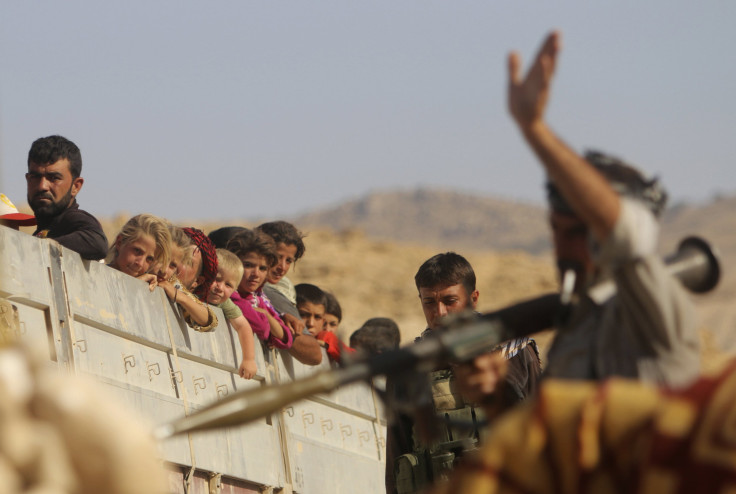ISIS Executions: 1,000 Iraqi Civilians Killed In ISIS-Controlled Towns Since June, Hundreds More Found In Mass Graves

Almost 1,000 people have been executed in Iraq over the last four months, most in areas controlled by the Islamic State, according to a tally based on numbers provided by Iraq Body Count, an independent monitoring group tracking civilian deaths in Iraq. That number is more than four times the number of Afghan civilians killed by the Taliban in all of 2009. The executions in Iraq took place in over 30 towns across the country; the number of people killed in any one instance ranged from one to 80 people, suggesting that the executions are both widespread and systematic, which could constitute a crime against humanity.
That number does not include the more than 820 people found in mass graves and in rivers in Iraq during the same period of time. Although the International Business Times cannot independently verify when those found in mass graves were killed, Human Rights Watch has said that at least 600 of them were killed this summer, after the Islamic State group began its surge in the country.
The rate of executions per month increased dramatically every month from July to October, indicating a possible parallel between the number of people executed and the rise of ISIS in the country. Mosul, an ISIS stronghold, experienced the highest number of executions of any other town in the country, totaling 160 people, but the single largest execution by ISIS in Iraq in the last four months took place in the northern town of Kojo, when more than 80 Yazidis were killed.
Before the beginning of U.S. airstrikes in Iraq, President Obama and senior U.S. politicians said that a "potential genocide" could occur on Mount Sinjar, where the Yazidis had taken refuge, if the military did not intervene. The Yazidis, they said at the time, were being persecuted by ISIS. Although Yazidis have been targets of ISIS executions, the data indicates that the executions have happened throughout the areas held by ISIS. Other cities with high numbers of civilians executed include Hit, Tikrit, Haditha and Shirqat.
So far, the U.S. and its coalition allies have not addressed directly the grave human rights abuses occurring in Iraq. There are only two organizations closely tracking the number of executions and other human rights abuses. Human Rights Watch recently published a report about the more than 500 people found in a mass grave near Mosul. Iraq Body Count tracks the number of civilians killed each day in Iraq and breaks that number down by type of killing and location. The United Nations, to some extent, has tracked human rights abuses committed by ISIS in Iraq. It has also documented violations committed by the Iraqi armed forces and paramilitaries, including summary executions of prisoners and detainees.
“Every day we receive accounts of a terrible litany of human rights violations being committed in Iraq against ordinary Iraqi children, women and men, who have been deprived of their security, their livelihoods, their homes, education, healthcare and other basic services,” U.N. High Commissioner for Human Rights Navi Pillay said in a statement published this summer.
Under international law, mass executions during armed conflicts are considered war crimes. If those mass executions are determined to be both widespread and systemic, they could constitute crimes against humanity. The International Criminal Court has the jurisdiction to prosecute individuals for genocide, crimes against humanity and war crimes and sometimes crimes of aggression. But the ICC is not intended to replace the national court system. Domestic courts are always the first line of accountability. If they are incapable of prosecuting or are not functional because of scenarios such as war, then cases are often referred to the ICC to prosecute.
Traditionally, though, international human rights law creates obligations imposed on states, not non-state actors like rebel groups. The ICC can only prosecute individuals from established and recognized governments that have signed the Rome Statute that created the court. This means individuals from ISIS cannot face prosecution by the ICC, and that it will be up to domestic courts, either in Iraq or in other countries, to prosecute the Sunni militant group's leaders for their crimes. Given that the ICC will most likely not try these crimes by ISIS, the U.N. could set up an independent tribunal to prosecute.
© Copyright IBTimes 2025. All rights reserved.





















